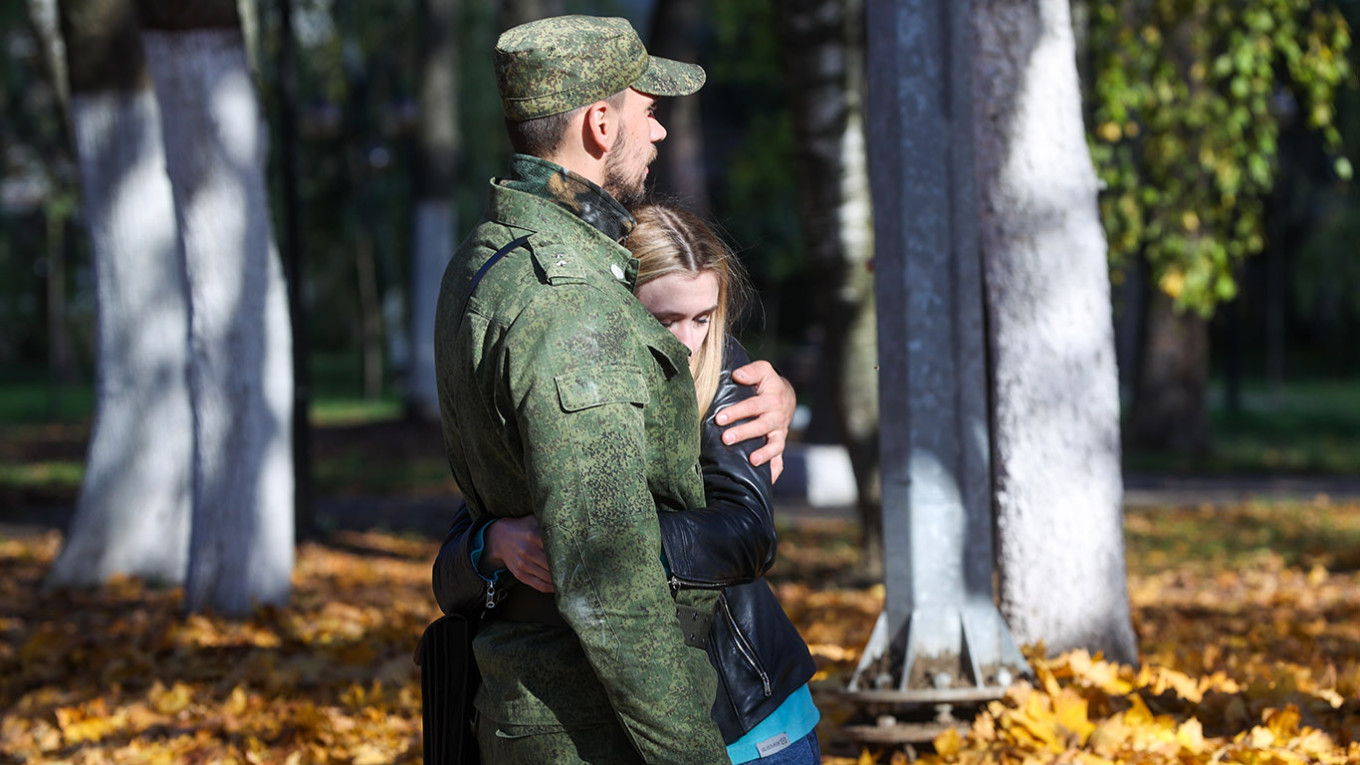The concept of a loyal woman patiently awaiting her husband’s return from war is deeply rooted and idealized in Russian culture. This image is prevalent in Soviet-era songs like “Katyusha” and in films that portray the endurance and pain experienced by the wives of soldiers.
In earlier conflicts, women would anxiously await letters from their loved ones; today, they look forward to video calls and WhatsApp messages from husbands deployed in Ukraine. Their feelings range from pride to fear, often mixed with emotions that are hard to fully articulate.
The narrative of devoted wives waiting for their partners is actively promoted by state media and social media platforms, which pressure women to support their husbands unconditionally. However, beneath these glamorous portrayals lies a more intricate reality.
Three women shared their stories with The Moscow Times, all wives of contract soldiers currently serving in Ukraine. Speaking anonymously, each one maintains an Instagram blog where they express their thoughts and feelings to an audience of thousands.
Their varied viewpoints highlight a society grappling with the dualities of war — one that is celebrated yet feared, where the act of waiting is both a matter of pride and personal distress.
In Tomsk, 27-year-old Anna* fully embraces her identity as a soldier’s wife. Her husband, an officer, has been deployed in Ukraine for seven months. Unlike many, she consciously chooses not to consume news.
“I don’t need to know everything that’s happening. My husband shares with me what I need to understand,” she states, her tone firm and assured. “I wait for his calls, and that’s sufficient for me.”
Shortly after his deployment, she created an Instagram blog to share narratives of resilience and patriotism.
In her posts, she expresses her longing for her husband but also the pride she feels in knowing he is “defending Russia.” When asked whom he is protecting specifically, she responds without hesitation: “Russians in Ukraine.”
“Every night, I light a candle and pray for him,” Anna reveals. “I completely believe that what he’s doing is right. This waiting — it’s my frontline. His responsibility is there; mine is here.”
Anna perceives her waiting as a duty akin to her husband’s service. She does not work, as his salary suffices for both of them. To her, being a military wife isn’t just a title; it’s a fundamental aspect of her identity.
She speaks with appreciation for Russia, calling it “the best country in the world with the best president.” There’s no hint of doubt for her — only unwavering faith.
For 24-year-old Yulia* in St. Petersburg, the experience contrasts sharply. She never wanted her husband to enlist.
“I urged him not to sign, but he insisted. He wanted to pay off our mortgage more quickly,” she shares, a trace of resignation in her voice. Before joining the military, her husband worked as an electrical consultant, earning 60,000 rubles per month. The contract provided him with a signing bonus of 1.8 million rubles.
Yulia maintains a blog where she attempts to project a positive outlook, often making jokes about life as a “military wife” and sharing humorous memes. Nevertheless, behind her cheerful online presence, she wrestles with the emotional burden she bears.
“I make light of it online, but at night, I often cry,” she admits. “Every time my phone rings, I’m terrified I’ll receive news that he’s been killed or injured.”
She recalls their last conversation before he left: “He held my face in his hands and said, ‘This is for us, for our future.’ But how can we have a future if he doesn’t return? Sometimes, I feel I am preparing for a life as a widow.”
Yulia struggles to understand what motivates men to go to war. “Maybe it’s about honor for them. Perhaps it has something to do with masculinity. I really don’t know. I try to be supportive, but it’s challenging.”
Despite her anxiety, she feels trapped in her waiting. The war is a reality she cannot evade, regardless of her efforts to maintain a facade of normalcy.
Maria*, 31, from Nizhny Novgorod, similarly never desired her husband to go to war. Their once harmonious marriage faced a significant challenge when his views on the conflict evolved.
“We opposed the war from the start,” she notes, bitterness seeping into her tone. “We even thought about emigrating. But over time, he shifted his perspective. The propaganda influenced him, just as it did many others.”
When he signed a military contract, Maria felt utterly shattered.
“We had a massive argument. I pleaded with him not to go, but he ignored me. Now, colleagues at work ask me, ‘Why did you let him go?’ as if I had any choice.”
Following his departure, Maria fell into a deep depression.
“I experienced a complete breakdown. I’m currently on antidepressants,” she shares.
Before the war, they had intended to start a family, and now she feels relieved that they didn’t.
“I can’t imagine raising a child under these circumstances,” she states. “It’s frightening.”
What troubles Maria the most is not just the act of waiting but the uncertain future that looms. As a psychologist, she is acutely aware of the heavy toll of war on the human psyche.
“I understand the damage combat can inflict on a person,” she articulates, her professional insights amplifying her personal despair. “The individual who returns — if he does come back — won’t be the same man I married. I fear living with a stranger who looks like my husband.”
A recent video call left her rattled: “His eyes seemed hollow. He described his day as if he were reading off a weather report. It struck me then: I’m already losing him, piece by piece.”
Maria distracts herself, often avoiding updates from her husband. She no longer holds onto the romantic narrative of their relationship.
Each woman’s experience is shaped not only by her personal situation but also by the broader societal narratives surrounding them.
Social media significantly contributes to the depiction of the dedicated military spouse. Pro-Kremlin Telegram channels and Instagram influencers portray these women as embodiments of strength and patriotism. Government-backed initiatives likewise promote unwavering female support, organizing events and even distributing medals to commend “exemplary” military wives.
The expectations are clear: they must wait, and they must do so with dignity.
However, behind this polished image lies a struggle for many. The economic pressures that drive men to enlist often leave their families in emotional disarray. The glorification of waiting creates an environment where doubt, fear, and grief are unwelcome. For women like Maria, who oppose the war, the solitude can be unbearable.
“These women are grappling with anticipatory grief — mourning someone who is still alive,” a Moscow psychologist specializing in trauma explained, wishing to remain anonymous due to the sensitive nature of the topic. “Society expects them to be resilient, but dismissing these emotions can lead to serious psychological effects.”
While waiting has always been an aspect of war, in contemporary Russia, it is polished and presented as a source of pride. Yet, beneath this shiny surface, the reality often consists of uncertainty, fear, and loss.
As Anna lights her nightly candle, Yulia creates another humorous post, and Maria gazes at her husband’s increasingly unfamiliar face on video calls, they all find themselves part of this waiting culture — each paying their personal cost for a war they did not choose but that has nevertheless reshaped their lives.
*Names have been changed for safety reasons.

